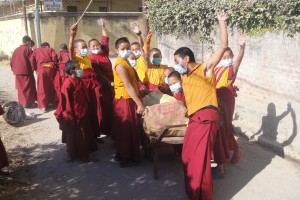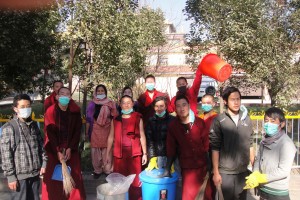Shechen Eco Group
May 2nd, 2012 | Published in NEWS
Shechen Monastery’s Eco Group, under the direction of Khyentse Yangsi Rinpoche, is working on environmental issues in Nepal.
With the encouragement of Shechen Rabjam Rinpoche and under the direction of Dilgo Khyentse Yangsi Rinpoche, some enthusiasts from Shechen Monastery in Nepal have formed the “Shechen Eco Group” with members from the monastery, monks, and Shechen’s Tsering Art School students.
Why: The reality of Global Warming and climate change affects us all. Nepal is a country that has recently been rated the 3rd worst air pollution in the world in terms of the effects on human health (EPI Index, Kathmandu Post January 31st 2012). There are a number of basic waste disposal and pollution problems in Nepal that needs to be dealt with on an individual and socio/political level.
How and Where: We believe that the key to change is education, so we are committed to ongoing educational awareness programs within the monastery. Once the systems and activities are strongly in place, our aim is to share this further with local communities and other monastic centers.
Shechen Rabjam Rinpoche has begun a number of environmentally sustainable initiatives within Shechen Monastery and its branches, including bio-gas for cooking, rainwater harvesting, and the installation of solar panels.
Mission Statement
Shechen Eco Group is dedicated to continuous environmental improvements within the monastery and greater community, in ways that fosters an environmentally sustainable future and leads to social and economical improvements. It works through: environmental community service, commitment to environmental mentoring, strong partnerships with neighbors, business and community, and by promoting “refuse, reduce, re-use and recycle”.
Goals and Activities towards “Zero Waste”
- Multi-language environmental presentations and signs (English, Tibetan, Nepali)
- Posters on the “Four R’s” have been posted in 3 languages around the monastery and area, as well as on saving power and water.
- Separated waste for recycling and re-using by local recyclers. Extra bins for separated garbage in the process of being made.
- The monastery has stopped the use of plastic covered food items for tsok offerings
- The distribution of disposable plastic plates and cups in pujas has ceased.
- Shechen Eco Bags have been made for distribution. The members and monks are all using these bags and refusing plastic when possible.
- Ongoing street and monastery cleanups (with safety gloves/gear) have been conducted by the group, which are held each Saturday afternoon when time permits (no pujas or exams etc).
- Composting and garden initiatives in the monastery and branches.
- Researching the use of a fire-brick machine to re-use organic waste for cooking.
- Ongoing educational training initiatives, including inviting other key environmental groups to share their knowledge and expertise.



